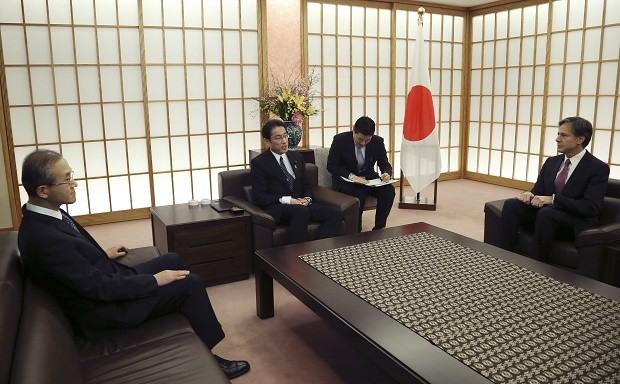
Japanese Foreign Minister Fumio Kishida, center left, speaks with South Korean First Vice Foreign Minister Lim Sung-nam, left, and US.Deputy Secretary of State, Antony Blinken, right, at the Foreign Ministry in Tokyo, Friday, Jan. 15, 2016. Lim and Blinken are in Tokyo to meet their Japanese counterpart on Saturday, Jan. 16 to discuss responses to North Korea’s latest nuclear test. AP
SEOUL, South Korea — North Korea said it could stop its nuclear tests in exchange for signing a peace treaty with the US and a stop to annual military exercises between the US and South Korea.
The North’s statement carried by the state media late Friday was a repeat of past offers that have been rejected by the US, which wants Pyongyang to commit to a complete abandonment of nuclear weapons.
An unnamed spokesman of the North’s Foreign Ministry called the purported hydrogen bomb test on Jan. 6 a justifiable move to ensure its survival against external threats.
“In response to the US continuously invading our sovereignty and making threatening provocations, we will acquire ourselves with all possible nuclear attack and nuclear retaliation abilities, but will not thoughtlessly use our nuclear weapons ,” the official Korean Central News Agency quoted the spokesman as saying.
READ: North Korea says nuclear test shows it could ‘wipe out’ US
The spokesman also called the South’s decision to restart anti-Pyongyang propaganda broadcasts along their tense border an “odd” provocation.
The North is extremely sensitive to outside criticism of the authoritarian leadership of Kim Jong Un and has been retaliating to Seoul’s loudspeaker campaigns by flying thousands of propaganda leaflets across the border. Earlier in the week, South Korean troops fired 20 machine gun warning shots after a North Korean drone briefly crossed the border.
The North’s H-bomb claims have been met with widespread condemnation and suspicion, but also questions on how to stop the country’s growing nuclear threat.
The Korean Peninsula remains technically at war because the 1950-53 conflict ended in an armistice, not a peace treaty.
Pyongyang has called the annual US-South Korean military drills a rehearsal for an invasion, though the allies have repeatedly said that the war games are defensive in nature.
READ: Obama, Putin call for tough response to North Korea